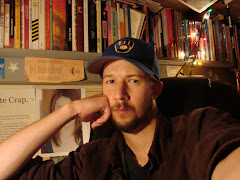Wednesday, March 26, 2008
Transhumanism Already Here?
I am very tired so I won't be able to expound as much or as cogently as I hope myself of the future will, but I just clicked on an online news video about a protein that "blinds" sperm, making them unable to recognize an egg. It is being developed as a male contraceptive.
In weeks past, I've been hearing many ads for a procedure known as essure, which injects little expanding metal springs into a woman's Fallopian tubes to block them and thus resulting in birth control.
While "transhumanism" is still thought of as something beyond what we are right now as a species, it is all too common to consider the many little steps being taken to subtly but fundamentally alter the nature of the human species. Something about the nature of birth control, especially these sophisticated biologically manipulative measures, seems to cut to the core of the kinds of alterations being done more and more routinely to human bodies--of humans who have the economic or cultural means to access them, further segregating them from those who lack those means. While artificial limbs become more and more adept and beneficial for war and dismemberment victims and as MIT professors talk about having sex with robots, one might wonder what happened to the narrative warning bells of the great science fiction writers of the 20th (and even 19th) century. Have we forgotten them or have we not read them? Or, do we feel we are superior to the open-ended moral arguments they posited uniquely and in many ways prophetically? Have we read or forgotten our Frankenstein? Our Brave New World? Or even our Jurassic Park (book, not movie).
I cannot here say that technology is wrong or bad. I don't believe it falls into that category--or can. And I don't believe that moral categories, even when functional, are absolute or discrete. But I do think that when we have commentators smiling and nodding about new birth control technologies, their slick accepting presentation about technological and sexual progress belies a slippery slope of possibility, some of it downright dystopic. As we as a species continue to refine and develop and enterprise new technologies, especially those which modify or augment the functioning of the human mind or body more or less directly, I argue it is important to seek a sounder, more whole understanding of what we are and are not already at present--prior to the choice of whether or not to use uncertain technologies. And I argue this better self-knowledge should inform such choices, which, though wrapped in the sugar-coating of medical discourse authority, are genuinely profound choices about the nature of what is human and what is good. This criticism may place me in the Luddite camp and it may seem ultraconservative. And I hope my fears in this regard are only ever demonstrated as fears of the unknown. But I wonder if we are even thinking in these terms. I wonder what other thresholds we cross silently in the night. I wonder about the future of the species. And I wonder about the presupposed value, which appears to underline research of this nature, of separating sexuality from fertility.
In weeks past, I've been hearing many ads for a procedure known as essure, which injects little expanding metal springs into a woman's Fallopian tubes to block them and thus resulting in birth control.
While "transhumanism" is still thought of as something beyond what we are right now as a species, it is all too common to consider the many little steps being taken to subtly but fundamentally alter the nature of the human species. Something about the nature of birth control, especially these sophisticated biologically manipulative measures, seems to cut to the core of the kinds of alterations being done more and more routinely to human bodies--of humans who have the economic or cultural means to access them, further segregating them from those who lack those means. While artificial limbs become more and more adept and beneficial for war and dismemberment victims and as MIT professors talk about having sex with robots, one might wonder what happened to the narrative warning bells of the great science fiction writers of the 20th (and even 19th) century. Have we forgotten them or have we not read them? Or, do we feel we are superior to the open-ended moral arguments they posited uniquely and in many ways prophetically? Have we read or forgotten our Frankenstein? Our Brave New World? Or even our Jurassic Park (book, not movie).
I cannot here say that technology is wrong or bad. I don't believe it falls into that category--or can. And I don't believe that moral categories, even when functional, are absolute or discrete. But I do think that when we have commentators smiling and nodding about new birth control technologies, their slick accepting presentation about technological and sexual progress belies a slippery slope of possibility, some of it downright dystopic. As we as a species continue to refine and develop and enterprise new technologies, especially those which modify or augment the functioning of the human mind or body more or less directly, I argue it is important to seek a sounder, more whole understanding of what we are and are not already at present--prior to the choice of whether or not to use uncertain technologies. And I argue this better self-knowledge should inform such choices, which, though wrapped in the sugar-coating of medical discourse authority, are genuinely profound choices about the nature of what is human and what is good. This criticism may place me in the Luddite camp and it may seem ultraconservative. And I hope my fears in this regard are only ever demonstrated as fears of the unknown. But I wonder if we are even thinking in these terms. I wonder what other thresholds we cross silently in the night. I wonder about the future of the species. And I wonder about the presupposed value, which appears to underline research of this nature, of separating sexuality from fertility.
Subscribe to:
Post Comments (Atom)



No comments:
Post a Comment